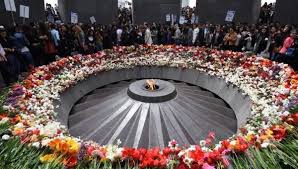 By Jivan Meguerditchian
By Jivan Meguerditchian
On a rainy night last April, I remember going down to the garage and seeing my grandparents sitting on the edge of brown leather chairs watching the Armenian news channels in front of the extra television my family set up as entertainment.
“It’s about time!” Dada shouted.
After asking him what was wrong, he told me to look at the bottom of the screen which listed the names of multiple countries. He explained to me that these were some of the new countries which had recently recognized the Armenian Genocide. Looking back at my dada, I noticed his increasingly sad expression. After a few moments of silence, my grandmother became a little emotional as well.
A hundred years ago, violence destroyed the unity of Armenian families, and caused the tears of many children, parents, and grandparents. A hundred years ago my family was affected by events that are still remembered by Armenians scattered worldwide. A hundred years ago my ancestors were victims of what is known today as the Armenian Genocide.
As a boy I came to understand that this period in our culture’s history was not easy to talk about with family members because of how the genocide affected them. Growing up, I generally knew the types of gruesome actions most Armenians faced at the time, but I did not know the extent of suffering experienced by my immediate ancestors.







